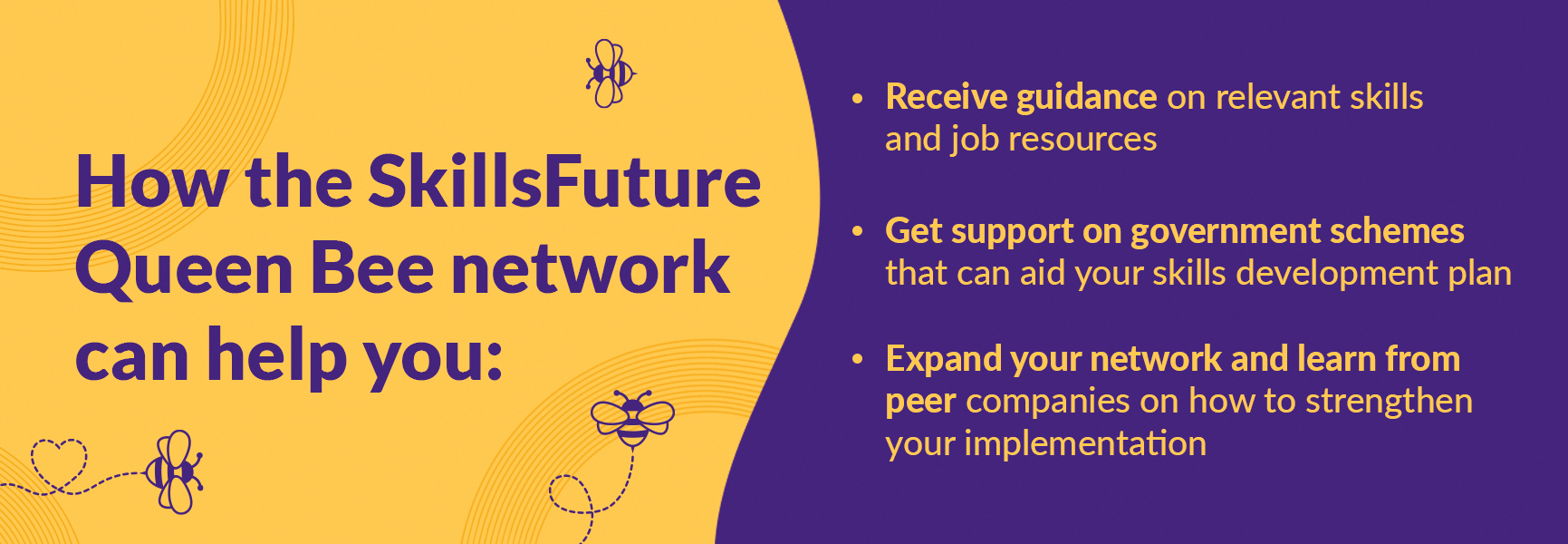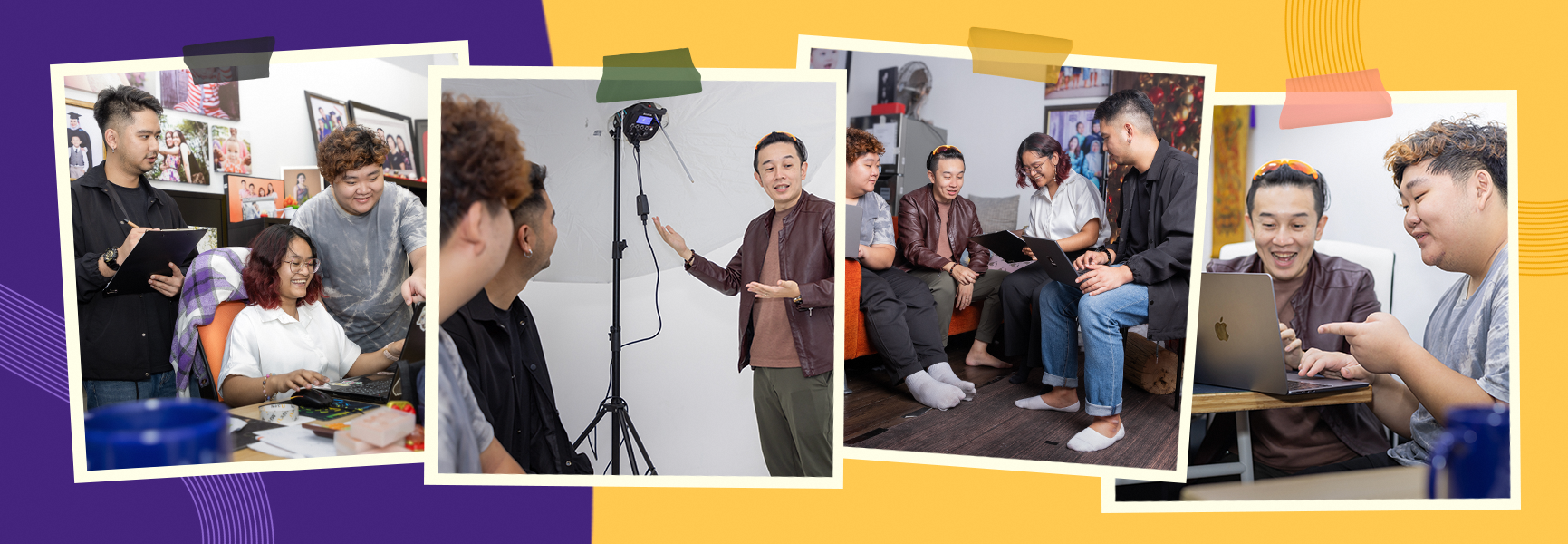From basic digital skills to management training, and programmes catering to the unique skills needs of each industry – there is no shortage of courses available to help small and medium enterprises (SMEs) upskill their employees.
However, three distinctive challenges remain: lack of awareness of existing courses supported by SSG and difficulty in choosing the appropriate course, lack of time and lack of financial resources.
“As many SMEs operate on an extremely lean manpower model and have to deal with day-to-day operational issues, business owners may not be able to think ahead about the skills needs of their workforce, conduct extensive research and select the right programmes offered by various training institutes to send their workers to,” says Ms Xu Wenshan, Director of Enterprise Engagement Division, SkillsFuture Singapore (SSG). “Even if they have chosen the programme, they find it challenging for their workers to take time off work for training. Some of them are also unaware of the wide range of funding support that they can tap on to alleviate financial concerns.”
Acknowledging these challenges, SSG has put in place several initiatives to help SMEs kickstart their training and upskilling practices.
Support to understand skills needs and relevant training programmes
Ms Xu recommends that they approach a SkillsFuture Queen Bee (SFQB) company for a broad-level consultation. “SFQB companies are industry leaders with strong sectoral expertise and industry standing. They will be able to impart best practices and useful advice on the skills needs for their industry, help SMEs recommend training programmes, including workplace learning, as well as funding schemes available.”
She adds: “SMEs can also leverage the Skills Profiling tool – a collaboration between SSG and JobKred, a local HR technology start-up – to evaluate employee strengths and skill gaps within their organisation. By using an AI-powered skills profiling technology, we help SMEs benchmark their employees’ competencies and identify training needs and solutions.”

Multiple pathways to create a strong learning culture
As the upskilling needs of every company are often multifaceted, there is no one-size-fits-all programme that can address each of their unique circumstances. Fortunately, the plethora of SkillsFuture initiatives available allows SMEs to customise the programmes and support schemes in ways that meet their needs.
One example is homegrown photography studio Firefly Photography, whose employees took part in the SkillsFuture Work-Study Programme, Workforce Singapore's Career Conversion Programmes and Workforce Development & Job Redesign .
Founded in 2012, the Singapore-based studio offers a wide range of creative services including corporate and event photography, as well as photo booth services.
Mr Benny Chow, Chief Marketing Officer, Firefly Photography, says: “One of our company’s core values is ‘Learning and People Development’, which we believe is key to ensuring that the business remains competitive in a rapidly evolving industry. When our employees adopt a learning mindset, our workplace becomes a sandbox where people can innovate and create better experiences for our customers.”
In its employee development journey, the company had to navigate its fair share of challenges when searching for the right courses. “A significant factor is time constraint, as each team member wears multiple hats. When someone is away for training, their workload accumulates and this creates stress for the individual, which is something we strive to minimise,” Mr Chow says.
The multitude of course options available can be overwhelming, and some of their content may not be directly applicable to the nature of their business. “We have to take into consideration both the relevance of the content as well as the course duration, to make sure that the training would not place additional stress on our team members,” he adds.
How did Firefly Photography learn about the available employee upskilling initiatives? Mr Chow explains that it was through a variety of channels – such as workforce-related seminars hosted by Workforce Singapore, as well as other events organised by Singapore National Employers Federation (SNEF), Association of Small & Medium Enterprises (ASME) and other industry peers. The company also leveraged the Skills Profiling tool for SMEs to better understand internal skill gaps. “This helped us narrow down the suitable training from the wide variety of courses available out there,” he adds.
Firefly Photography’s efforts paid off and the company has been reaping the benefits of the diverse employee upskilling programmes. “Besides better customer reviews and cost savings due to increased efficiency, our employees are also happier at work because the new skill sets they picked up have provided them with more purpose in their job roles,” says Mr Chow. “We are also grateful for the invaluable support from SSG and the Institutes of Higher Learning (IHLs). They have been very attentive and understanding of our needs along the way, from helping us to identify suitable programmes to follow up sessions after the courses were completed.”

A seamless upskilling process for SMEs
Ms Xu pointed out that for most SMEs, funding should be the least of concerns as grants offered by SSG cover up to 90 per cent of the training costs.
“We recognise that the main focus for most SME owners is business viability and profitability. The key challenge is in creating the mindshare that investment in human capital through skills-based training is integral to business strategy for longer-term growth, talent attraction and retention. It is necessary to provide SMEs with the awareness of training support available to them, so they can leverage the programmes, tools and funding to achieve their desired business outcomes,” she says.
There are four ways in which SSG is addressing these barriers to employee development. These include (a) promoting workplace learning to create more conducive environments that support employee upskilling in situ without taking time away from work for training; (b) bundling training programmes with business and digital solutions for a more integrated end-to-end value chain approach; (c) curating masterclass sessions at accessible venues to encourage attendance; and (d) linking enterprises with SFQB companies and IHLs that provide problem-based learning for employees.
“For SMEs looking to strengthen their competitive edge, employee development is an imperative. With the wide range of available support, there has never been a better time to start than now,” says SSG. “The sooner they start, the earlier they can reap the benefits.”
If you are an SME looking to embark on or enhance skilling opportunities in your company, here is where you can start: https://www.skillsfuture.gov.sg/companies/